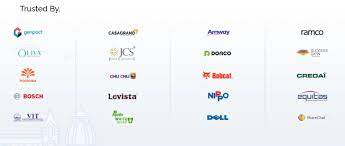The Best Digital Campaigns of 2019
2019 was a year filled with innovative and impactful digital campaigns that captured the attention of audiences worldwide. From creative storytelling to interactive experiences, brands pushed the boundaries of digital marketing to engage and connect with consumers in new and exciting ways.
Nike: Dream Crazy
Nike’s “Dream Crazy” campaign featuring Colin Kaepernick sparked conversations and inspired audiences with its powerful message of believing in your dreams despite obstacles. The campaign resonated with viewers on a personal level, making it one of the most talked-about campaigns of the year.
Burger King: Whopper Detour
Burger King’s “Whopper Detour” campaign cleverly combined mobile technology with a bold marketing strategy. By encouraging customers to order a Whopper through their app while at a McDonald’s location, Burger King successfully drove sales and generated buzz across social media platforms.
Spotify: Wrapped 2019
Spotify’s annual “Wrapped” campaign personalised music listening experiences for users by showcasing their top songs, artists, and genres from the year. The campaign not only engaged existing users but also attracted new audiences through social sharing and personalised recommendations.
Airbnb: Night At The Louvre
Airbnb’s collaboration with the Louvre Museum offered a once-in-a-lifetime opportunity for guests to spend a night inside the iconic museum. This unique experience generated significant media coverage and showcased Airbnb’s commitment to creating unforgettable travel experiences for its customers.
Coca-Cola: #ShareACoke
Coca-Cola continued its successful “Share A Coke” campaign in 2019 by personalising bottles with popular names and encouraging consumers to share them with friends and loved ones. The campaign fostered a sense of connection and community while driving sales and brand loyalty.
In conclusion, the best digital campaigns of 2019 demonstrated the power of creativity, storytelling, and consumer engagement in shaping successful marketing strategies. As we look ahead to future trends in digital marketing, these campaigns serve as inspiration for brands seeking to make a lasting impact on their target audiences.
Top 9 Tips for Crafting Successful Digital Campaigns in 2019
- Leverage data analytics to understand your audience better.
- Utilise social media platforms for targeted advertising.
- Create engaging video content to capture attention quickly.
- Incorporate influencer marketing to expand reach and credibility.
- Use storytelling techniques to connect emotionally with your audience.
- Optimise campaigns for mobile devices as users increasingly access content on-the-go.
- Employ A/B testing to refine ad creatives and messaging continuously.
- Focus on personalisation to deliver relevant content and offers.
- Monitor campaign performance in real-time and adjust strategies as needed.
Leverage data analytics to understand your audience better.
In the realm of best digital campaigns in 2019, a crucial tip emerged: leveraging data analytics to gain deeper insights into your audience. By harnessing the power of data analytics, brands were able to understand their target demographics, preferences, and behaviours more effectively. This invaluable information allowed marketers to tailor their campaigns with precision, ensuring that content resonated with audiences on a personal level. In an era where consumer engagement is paramount, utilising data analytics proved to be a game-changer in creating successful and impactful digital campaigns that not only captured attention but also fostered lasting connections with customers.
Utilise social media platforms for targeted advertising.
In the realm of best digital campaigns in 2019, a crucial tip that stood out was the strategic utilisation of social media platforms for targeted advertising. By leveraging the vast reach and sophisticated targeting capabilities of platforms such as Facebook, Instagram, and Twitter, brands were able to tailor their messages to specific demographics, interests, and behaviours of their desired audience. This approach not only maximised the effectiveness of marketing efforts but also fostered meaningful connections with consumers, ultimately leading to higher engagement and conversion rates.
Create engaging video content to capture attention quickly.
In the realm of best digital campaigns in 2019, a key tip that emerged was the importance of creating engaging video content to capture attention swiftly. Video content has proven to be a powerful tool for brands to connect with their audiences in a dynamic and impactful way. By crafting compelling videos that resonate with viewers from the outset, brands can effectively grab attention and convey their message efficiently in today’s fast-paced digital landscape. This strategy not only helps to engage audiences but also enhances brand visibility and fosters meaningful connections with consumers.
Incorporate influencer marketing to expand reach and credibility.
Incorporating influencer marketing into digital campaigns in 2019 proved to be a highly effective strategy for expanding reach and enhancing credibility. By partnering with influencers who have a loyal following and strong influence within their niche, brands were able to connect with target audiences in a more authentic and engaging way. Leveraging the trust and authority that influencers hold among their followers helped brands to not only increase their reach but also build credibility and foster meaningful connections with consumers. This approach demonstrated the importance of tapping into influencer networks to amplify brand messages and drive successful digital campaigns in 2019.
Use storytelling techniques to connect emotionally with your audience.
In the realm of best digital campaigns in 2019, a key tip that stood out was the effective use of storytelling techniques to establish emotional connections with audiences. By weaving narratives that resonate on a personal level, brands were able to evoke feelings of empathy, inspiration, and relatability among consumers. Through compelling storytelling, these campaigns transcended traditional marketing approaches and fostered deeper relationships with their target audience, ultimately leading to increased engagement and brand loyalty.
Optimise campaigns for mobile devices as users increasingly access content on-the-go.
In the realm of best digital campaigns in 2019, a crucial tip emerged: optimising campaigns for mobile devices is paramount as users increasingly access content on-the-go. With the rise of mobile usage, ensuring that digital campaigns are tailored for seamless viewing and interaction on smartphones and tablets is essential to engaging audiences in today’s fast-paced, mobile-centric world. By prioritising mobile optimisation, brands can enhance user experience, reach a wider audience, and maximise the effectiveness of their digital marketing efforts.
Employ A/B testing to refine ad creatives and messaging continuously.
Employing A/B testing to refine ad creatives and messaging continuously was a key strategy that set apart the best digital campaigns of 2019. By testing different variations of ad content and messaging, brands were able to gather valuable insights into what resonated most with their target audience. This data-driven approach not only optimised campaign performance but also allowed for real-time adjustments to maximise engagement and conversions. In a competitive digital landscape, the ability to iterate and refine based on A/B testing results proved essential in creating successful and impactful marketing campaigns.
Focus on personalisation to deliver relevant content and offers.
In the realm of best digital campaigns in 2019, a key tip that stood out was the emphasis on personalisation to deliver tailored content and offers to consumers. By focusing on personalisation, brands were able to create more meaningful connections with their target audience by providing relevant and engaging experiences. This approach not only enhanced customer satisfaction but also increased engagement and conversion rates, showcasing the importance of delivering content and offers that resonate with individual preferences and needs.
Monitor campaign performance in real-time and adjust strategies as needed.
Monitoring campaign performance in real-time and adjusting strategies as needed is a crucial tip for running successful digital campaigns in 2019. By closely tracking key metrics such as engagement rates, click-through rates, and conversion rates, marketers can quickly identify what is working well and what needs improvement. This real-time data allows for agile decision-making, enabling teams to make timely adjustments to optimise campaign performance and maximise results. By staying responsive to changing trends and audience behaviour, brands can ensure that their digital campaigns remain relevant and effective in reaching their target audience.






